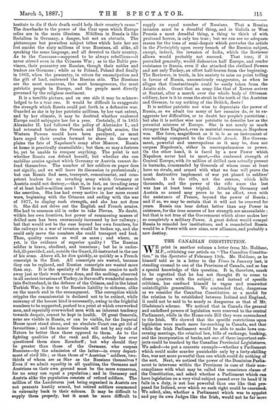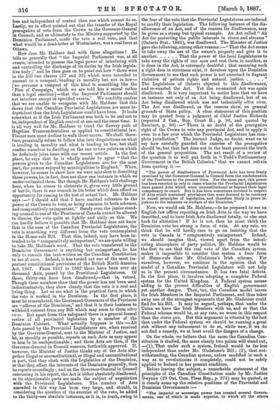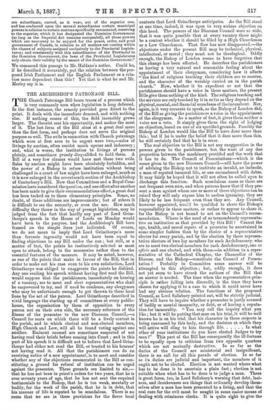THE CANADIAN CONSTITUTION.
Wprint in another column a letter from Mr. Haldane, V V M.P., criticising our article on "The Canadian Constitu- tion," in the Spectator of February 19th. Mr. Haldane, as he himself told us in a letter to the Times in January last, is standing counsel to one of the Provinces of Canada, and so has a special knowledge of this question. It is, therefore, much to be regretted that he has not thought fit to come to closer quarters with the subject ; and instead of specific criticism, has confined himself to vague and somewhat unintelligible generalities. We contended that, dangerous as we consider the Canadian Constitution as a model for the relation to be established between Ireland and England; it could not be said to be nearly as dangerous as that of Mt-. Gladstone's scheme. We noticed that in Canada the general and undefined powers of legislation were reserved to the central Parliament, while in the Home-rale Bill they were surrendered to the Irish. We showed that the specific restrictions upon legislation were much more far-reaching in Canada, and that while the Irish Parliament would be able to make laws con- cerning marriage, the criminal law, bills of exchange, banking, and the incorporation of banks, not one of these important sub- jects could be touched by the Canadian Provincial Legislatures. We asked—to put a concrete example—whether a Parliament which could make murder punishable only by a forty-shilling fine, was not more powerful than one which could do nothing of the sort. Next, we noticed the power of the Dominion Parlia- ment to intervene within the Provinces in case of their non- compliance with what may be called the conscience clause of the Constitution, and asked whether a Parliament which can have legislation on a very vital subject passed over its head if it fails in a duty, is not less powerful than one like that pro- posed for Ireland, over which no such right could be exercised: We asked, also, whether a Parliament which was to appoint and pay its own Judges like the Irish, would-not be fairmoce
free and independent of control than one which cannot do so. Lastly, we in effect pointed out that the transfer of the Royal prerogative of veto from the Crown to the Governor-General in Council, and so ultimately to the Ministry supported by the Dominion Parliament, made the veto a real veto, and that what would be a dead-letter at Westminster, was a real force at Ottawa.
How does Mr. Haldane deal with these allegations ? He tells us generally that " the Imperial Parliament was, at all events, intended to possess the legal power of interfering with and controlling the discharge of its duties by the Irish legisla- tive body ;" and he then goes on to point out how " there were in the Bill two clauses (37 and 39) which were intended to amount to a compact, binding in morality but not in law— [we presume a compact of this kind is something like the Plan of Campaign, which we are told has a moral rather than a legal sanction]—that the Imperial Parliament should not interfere except in specified events." We candidly confess that we are unable to recognise with Mr. Haldane that this shows that the Canadian Provincial Legislatures are more in- dependent than the Irish Legislature would have been. It looks somewhat as if the Irish Parliament was both to be and not to be, independent of English control at one and the same time. It is all very well for Mr. Haldane to tread the flowery path of Hegelian Transcendentalism as applied to constitutional law. Plainer men must decline to walk those mazes. We shall, there- fore, prosaically refuse to follow him into disquisitions on what is binding in morality and what is binding in law, but shall confine ourselves to dwelling on the one or two points on which he definitely joins issue with our recent article. In the first place, he says that he is wholly unable to agree "that the powers given to the Canadian Legislatures are, for the most part, the powers enjoyed by municipalities in England." When, however, he comes to show how we were mistaken in describing those powers, he, in fact, does not show one instance in which we under-estimated them. Bat though Mr. Haldane's bold challenge here, when he comes to elaborate it, gives very little ground of battle, there is one remark in his letter which does afford an opportunity for coming to the test of actual fact. Mr. Haldane says :—" I should add that I have omitted reference to the power of the Crown to veto, as being common to both schemes, and comparatively unimportant." Surely even the junior stand- ing counsel to one of the Provinces of Canada cannot be allowed to dismiss the veto quite so lightly and airily as this. We can hardly believe it possible that Mr. Haldane does not know that in the case of the Canadian Provincial Legislatures, the veto is something very different from the veto contemplated in the Home-rule Bill. That this, indeed, may have been in- tended to be " comparatively unimportant," we are quite willing to take Mr. Haldane's word. That the veto transferred to the Dominion Government is anything but unimportant, he has only to consult the text-writers on the Canadian Constitution to see at once. Indeed, it has turned out one of the moat im- portant constitutional provisions of the British North America Act, 1867. From 1867 to 1882 there have been over six thousand Acts, passed by the Provisional Legislatures. Of these, thirty-one have been disallowed,—that is, vetoed. Though these numbers show that the power has not been used indiscriminately, they show clearly that the veto is a real and living thing. Let us see what is the practical form in which the veto is worked in the Dominion. In the first place, it must be remembered, the Lieutenant-Governors of the Provinces are "officers of the Dominion," and that it is their business to withhold consent from any Bill which may seem to them ultra sir es. But apart from this safeguard there is a general formal review of all provincial legislation by a member of the Dominion Cabinet. What actually happens is this :—All Acts passed by the Provincial Legislatures are, when received by the Governor-General, sent to the Minister of Justice, and he, as speedily as possible, reports on such Acts as may appear to him to be unobjectionable ; and these Acts are then, if the Governor-General in Council concurs, forthwith approved. If, however, the Minister of Justice thinks any of the Acts alto- gether illegal or unconstitutional, or illegal and unconstitutional in part, that they clash with the Legislation of the Dominion, or that they affect the interests of the Dominion generally, then he reports accordingly ; and on the Governor-General in Council concurring in his report, the Act is either absolutely disallowed, or its objectionable parts are made the subject of negotiation with the Provincial Legislatures. The number of Acts emended in this way has bean very large, and should, in considering the question of the exercise of the veto, be added to the thirty-one absolute instances, as it is, in truth, owing to
the fear of the veto that the Provincial Legislatures are induced to modify their legislation. The following instance of the dis- allowance of an Act, and of the reasons for disallowance, may be given as a strong but typical example. An Act called " An Act for protecting the public interests in rivers and streams" (Ontario Stat., 1881), was disallowed. The Minister of Justice gave the following, among other reasons:—" That the Act seems to take away the use of the owner's property and give it to another That the power of the local Legislatures to take away the rights of one man and vest them in another, as is done in the Act, is extremely doubtful ; that assuming such a right does in strictness exist, it devolves upon the Dominion Government to see that such power is not exercised in flagrant violation of private rights and natural justice The Legislature of Ontario objected to this disallowance, and re-enacted the Act. Yet the re-enacted Act was again disallowed. It is very important to notice here that we have an instance not only of an Act being disallowed, but of an Act being disallowed which was not technically ultra vire& The Act was disallowed, as the reasons show, on general grounds of State policy. A clear statement of this position may be quoted from a judgment of Chief Justice Richards (reported 2 Can., Sup. Court R., p. 96, and quoted by Bourinot, p. 80) :—" There is no doubt of the prerogative right of the Crown to veto any provincial Act, and to apply it even to a law over which the Provincial Legislature has com- plete jurisdiction." The learned Judge, no doubt, went on to say how carefully guarded the exercise of the prerogative should be, but that fact does not in the least prevent the truth of the general proposition. The net result of a review of the question is so well put forth in " Todd's Parliamentary Government in the British Colonies," that we cannot refrain from quoting it :—
" The power of disallowance of Provincial Acts has been freely exercised by the Governor.General iu Connell from the confederation of the Provinces to the present time. For the most part, this power has been resorted to only in cases wherein the Provincial Legislatures have passed Acts which were unconstitutional or beyond their legal competency to enact. But it has been sometimes invoked in respect of Acts which contained provisions that were deemed to be contrary to sound principles of legislation, and therefore likely to prove in. furious to the interests or welfare of the Dominion."
Now, we would ask Mr. Haldane,—Is he prepared to see an English law officer reporting on Irish Acts in the way we have described, and to have Irish Acts disallowed totally, or else sent back for alteration ? If he is not, then he must think the Dominion veto too strong a form of veto. At any rate, we think that he will hardly care to go on insisting that the veto in Canada is "comparatively unimportant." Indeed, we should imagine that, viewed apart from the intoxi- cating atmosphere of party politico, Mr. Haldane would be the first to see that the real veto of the Canadian system makes it impossible to consider that system a freer form of Home-rule than Mr. Gladstone's Irish scheme. For ourselves, however, we continue in the opinion that the model of a Canadian Provincial Legislature will not help us in the present circumstances. It has two fatal defects. In the first place, it involves adopting a complete Federal system for the United Kingdom. A Federal system means adding to the present difficulties of English government yet another danger. Then, too, the Canadian model leaves the Irish Members in the Imperial Parliament, and thus takes away one of the strongest arguments that Mr. Gladstone could find for his Bill. It may be argued, perhaps, that under the Union we have the Irish Members with us, and so that the Federal scheme would be, at any rate, no worse in this respect than the status quo. But this argument is vitiated by the fact that under the Federal system we should be running a great risk without any inducement to do so, while now, if we do not find a remedy, we at least avoid the dangers of a change.
On the whole, we believe that the more the Canadian Con- stitution is studied, the more clearly two points will stand out, —(1), That under such a system, Ireland would be far less independent than under Mr. Gladstone's Bill ; (2), that not- withstanding, the Canadian system, unless modified in such a way as to revolutionise it completely, could not be safely applied to Ireland in her present condition.
Before leaving the subject, a remarkable statement of the principles of the Canadian Constitution made by Mr. Justice Gwynne (29 Ont. Cora. Pleas Rep., p. 274) may be quoted, as it clearly sums up the relative positions of the Provincial and Dominion Governments :-
"The imperial or sovereign power has created several Govern.. meats, one of which is made superior, to which all the others
are subordinate, carved, as it were, oat of the superior one, and has conferred upon the several subordinates certain mnnioipal powers in relation to certain matters specifically enumerated, reserving to the superior, which it has designated the Dominion Government (so long us the Imperial Act remains nnrepealed), all those powers which are necessary to be enjoyed for the peace, order, and good government of Canada, in relation to all matters not coming within the classes of subjects assigned exclusively to the Provincial Legisla- tures; and consistently with this subordination of the Provincial to the Dominion Government, the laws of the Provincial Legislatures only obtain their validity by the assent of the Dominion Government."
We commend this passage to Mr. Haldane's notice. Could he, if he described it accurately, put the relation between the pro- posed Irish Parliament and the English Parliament as a rela- tion more dependent than this / Yet that is what he and Mr. Morley say it is.




































 Previous page
Previous page